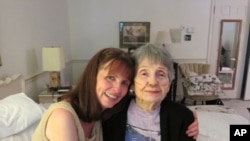People faced with life-threatening illness are often moved to leave some sort of lasting personal oral history for their loved ones.
StoryCorps is an organization which provides people and their families with the opportunity to record, preserve and share their stories with loved ones, preserving those stories on CDs and in the archives at the Library of Congress.
Now, the group has created the StoryCorps Legacy initiative. Partnering with hospitals, hospices and cancer centers, it helps people with life threatening medical conditions record their stories.
StoryCorps staff member Perri Chinalai takes a break in the chapel inside the Mollie and Jack Zicklin Hospice Residence in Riverdale, New York.
It's a facility where people come to die in peace but Chinalai explains it is also a place where life is celebrated and expressed through storytelling and careful listening.
“The motto of StoryCorps is that ‘Listening is an act of love,’ and we really believe beautiful things can happen when we actually sit down with one another to have a conversation and listen to what we have to say to one another," she says. "Sometimes when you are sharing your story and you know that people out there will be listening to it in the future, it brings some validation to all of the life that you have lived."
Reign Voltaire and his niece, Jennifer Pena, are recording her stories. Pena, 32, has suffered from tubular sclerosis since childhood and breathes with the aid of an oxygen machine.
Voltaire finds that the seemingly trivial memories they share - a trip to an amusement park or Thanksgiving meals - acquire a special luster and significance.
“Even though it is a simple memory of ours, I felt it was something to honor, because it is her legacy," Voltaire says. "It is something we will always remember.”
Sometimes the conversation can be intensely intimate, and things that might have been left unsaid, are not. Gail Moore's mother, Dorothy, lives in her own home, her daughter is her caregiver.
"I just want to say what a privilege it is to be your daughter," Gail tells her mother.
"I am privileged to be your mother," Dorothy says. "We have had a very, very happy existence."
Then Gail asks her mother what she thinks about the notion of dying.
"People should think about dying because it only gives them so much time to make their mark on this world," Dorothy says. "If you did not know there would be a limit to how long you were going to live, when would you get started?"
For veteran facilitator Debra Parmet Sondoc, that sort of wisdom helps make her StoryCorps volunteer work worthwhile. She helps set up sessions at Memorial Sloan Kettering Cancer Center in New York.
“It is life affirming. People talk about appreciating every moment and every day," she says. "Being able to be so strong and be so positive and find the people in their lives that are there for them, it is a wonderful thing.”
The deep listening that StoryCorps promotes can also help health professionals. Palliative care specialist Dr. Daniel Spurgeon often works with terminally ill patients at Huntington Hospital in Pasadena, California.
After facilitating and conducting storytelling sessions, he's realized a patient’s words and demeanor can offer vital clinical information that laboratory tests cannot.
"And the more present and the fuller my heart can be, the more I can do this work," Spurgeon says. "I feel that when I engage with a person's story, I am going beyond their identity as a patient and engaging in their personhood. And I think there is where real compassion, there is where the 'being' of healing is, rather than doing of healing."
That has been the experience of the thousands of people who have been touched by StoryCorps: that authentic conversation, in which one person speaks from the heart, and another truly listens, is a rare and precious gift.




